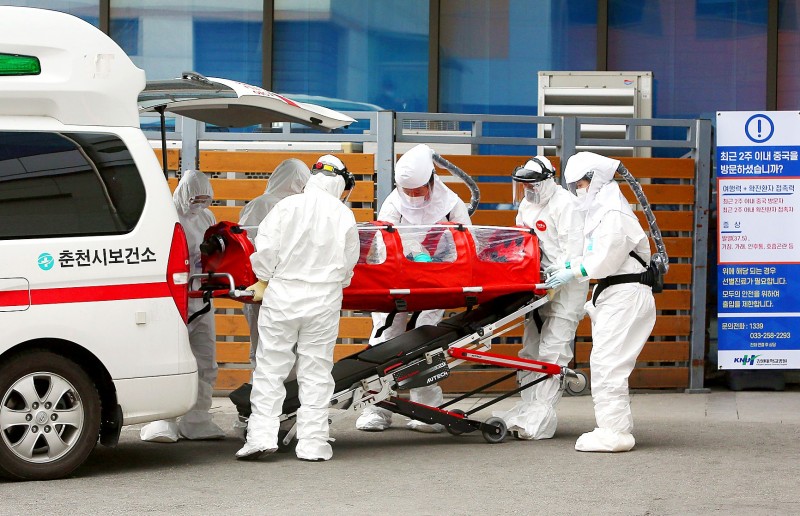《TAIPEI TIMES》 Fears grow with more global cases

Medical personnel in hazmat suits wheel a confirmed coronavirus patient into a hospital in Chuncheon, South Korea, yesterday. Photo: Reuters / Yonhap
/ AFP, BEIJING
Fears mounted yesterday over the growing spread of COVID-19 outside of China, as the WHO warned of a shrinking window to stem the spread of the deadly disease.
The warning came as the first European died from COVID-19, which has now reached more than 25 countries and caused more than a dozen deaths outside of China.
A 78-year old Italian man died after testing positive for the virus, while the death toll reached five in Iran and a number of new cases were reported in the Middle East.
Italy has locked down 10 towns and asked more than 50,000 people to stay home — a move with echoes of China’s lockdown of entire cities in central Hubei Province, the epicenter of the outbreak where millions remain under quarantine.
Authorities reported a second death in South Korea, as well as a surge of nearly 150 new infections, with many cases linked to a hospital and a religious sect.
The disease has claimed 2,345 lives in China and infected more than 76,000 people.
In China, the number of new cases outside of Hubei has been generally declining, although new outbreaks have emerged in several prisons and hospitals.
Chinese authorities yesterday reported nearly 400 new cases nationwide, less than half the previous day and just 31 outside of Hubei.
However, concerns have risen about the reliability of the official data, after Hubei officials changed methods of counting cases and amended their figures.
Meanwhile, WHO Director-General Tedros Adhanom Ghebreyesus said that the “window of opportunity” to contain the international spread of the outbreak was “narrowing.”
If nations do not quickly mobilize to fight the reach of the virus, “this outbreak could go in any direction. It could even be messy,” he said.
A WHO-led team of experts were to visit Wuhan, the capital of Hubei, where the local government yesterday said that a 70-year-old man was infected, but did not exhibit symptoms until 27 days later, meaning the virus’ incubation period could be much longer than the presumed 14 days.
A longer incubation period could complicate efforts to contain spread of the epidemic.
The man, identified only by his surname, Jiang, on Jan. 24 drove to Shennongjia, in northwestern Hubei, from eastern Ezhou, where he had close contact with his sister, who had been infected, the provincial government said on its Web site.
Jiang had a fever on Thursday and tested positive for coronavirus a day later, it said.
Cases of the deadly virus were reported in a range of countries in the Middle East, including the first cases in Israel and Lebanon.
Iran said that five people there had died and 28 been infected.
Iraq and Kuwait were on high alert for a potential outbreak after banning travel to and from the Islamic Republic, although they have not confirmed any cases domestically.
Nearly 350 people have been infected in South Korea, including two deaths, making it the hardest-hit country outside of China.
The US advised citizens to avoid traveling by cruise liner in Asia, because it said that the vessels acted as amplifiers of the virus.
The latest group of passengers yesterday disembarked from the virus-stricken Diamond Princess cruise ship in Japan.
Several Australians and an Israeli, who were evacuated earlier this week after being cleared in Japan, tested positive for the disease on landing in their home countries — fueling questions about Tokyo’s policy of allowing former passengers to return home.
The British government confirmed on Twitter that an evacuation flight yesterday left Japan with 32 British and European passengers on board.
As fears spread of the virus in Japan, Tokyo Games organizers postponed training for their army of volunteers due to the outbreak — but said that there was “no consideration” of canceling the Olympics.
Beijing has so far downplayed any possible long-term effects on the Chinese economy from the outbreak, which has paralyzed much of the country.
People’s Bank of China Deputy Governor Chen Yulu (陳雨露) yesterday told state broadcaster China Central Television that economic growth would “quickly rebound.”
The Chinese Communist Party Politburo Standing Committee has also dismissed the potential economic fallout from the virus, earlier this month urging local governments to “continue striving” to achieve this year’s economic development targets.
In a letter to the Bill & Melinda Gates Foundation thanking it for financial support, Chinese President Xi Jinping (習近平) said that China was at a “critical moment” in the fight against the outbreak.
The “unprecedented measures” were “delivering substantial results,” he said.
In the latest unprecedented measure, Wuhan officials were calling in seven river cruise ships to house medical workers.
The People’s Daily said that the ships would provide another 1,469 beds and help accommodate some of the tens of thousands of medical workers transported to the city to help treat coronavirus patients.
Additional reporting by Reuters
新聞來源:TAIPEI TIMES















